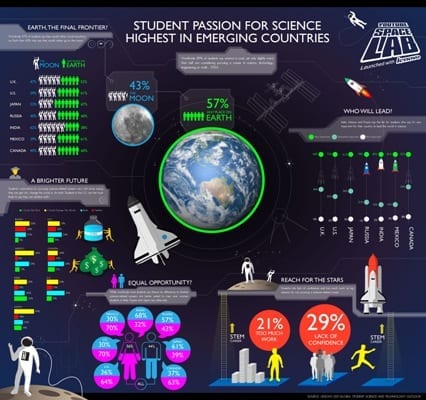When asked if given the opportunity to take a trip to the moon or anyplace on Earth, just 43 percent in total chose the moon, although 62 percent of students in India polled said they would suit up for the ride.

“These results are eye-opening in calling attention to the differences in how students around the world view science as a career aspiration,” said Michael Schmedlen, worldwide director of education, Lenovo. “While the study shows some interesting disparities, the outcomes suggest possible solutions for how to engage students and foster their passion for science. As the world’s #1 PC-maker in education, we believe programs like our partnership with YouTube Space Lab will do this by providing world-class judges as mentors along with phenomenally cool incentives like astronaut training and technology prizes.”
Interest Varies by Nationality
Important to Lead the World in Science
- According to the survey, students in India ranked highest (82 percent) for those who believe it’s very important for their country to lead the world in science, closely followed by students in Mexico and Russia (81 and 78 percent, respectively). In contrast, students in the U.S., Japan, the U.K. and Canada trailed at 73, 61, 60 and 55 percent, respectively.
Science More Important Than Arts
- When compared to the arts, students in Mexico (82 percent) and India (74 percent) topped the list, overwhelmingly saying that science is more important than fields such as literature, music and theatre. Russia was the only country where the majority of students (57 percent) believed the arts were more valuable than science and technology compared with 37 percent of respondents overall who answered similarly.
Shortage of Scientists Influences Career Choice
- The contrast between students in emerging and developed countries becomes more obvious when students are asked if their country has enough scientists and whether this influences their career choice. Most students around the world (73 percent) agree there is a lack of scientists, and students in Mexico and Russia are especially aware of this (92 percent and 89 percent, respectively). Across all countries, this deficiency motivates 65 percent of kids to pursue a science-related career. This motivation is highest in India (80 percent) and Mexico (75 percent) and Russia (55 percent). Japanese students fall somewhere in the middle while students in Canada, the U.S. and the U.K. have lower scores.
Pursuing Science, Technology, Engineering or Math
- When it comes to who’s actually planning to pursue a STEM-related career, students in the three emerging countries rank highest. Mexico tops the list with 69 percent of students saying they plan to pursue one, outpacing India’s 62 percent and Russia’s 55 percent. Just over half (54%) of U.S. students have this opinion, while students in the U.K. and Japan trail significantly behind, with just 42 percent and 35 percent respectively answering similarly.
Aspirations to Change the World
- Students consider other factors in their career choice. Of interest, most overall say that if they pursued a STEM-related career they hoped to change the world (35 percent), with monetary factors ranking farther behind. Just 16% of respondents overall say they would do it to get rich, while 34 percent say they could attain both – with U.S. students saying this most frequently (45 percent).
Removing Barriers & Inspiring Students
The study’s most encouraging finding reveals that a vast majority of students say science is cool, however, only a slight majority responded that they intend to pursue a science/STEM-related career. The top reasons cited for those not pursuing this career type are a lack of confidence in their abilities and too much work/schooling required. Of interest, most students say they choose by middle school whether or not to pursue science and that their parents and teachers play a key role in shaping their decisions. The study also finds that access to technology factors into student interest. Most students report the laptop/PC as the piece of technology most influential in shaping their pursuit of science, followed by Internet access.
Space Lab Global Science Program
Survey Methodology
RedShift Research surveyed 4,800 students online between Oct. 28 and Nov. 1, 2011, in two categories: high school (14-17 years old) and full/part-time university students (18-22 years old). Overall, completed responses totaled 800 per country in the U.S., U.K. and Canada, and 600 per country in India, Japan, Mexico and Russia with conclusions and key observations noted at the 95 percent level of confidence.
About Lenovo
